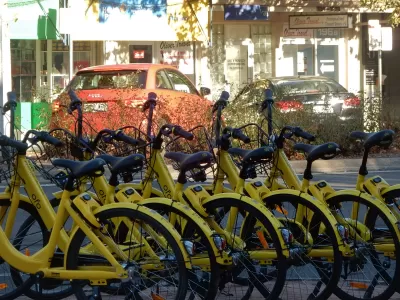The Chinese company seemed to be dominating its corner of the shared mobility market—until its dramatic downfall.

Ofo bikes were once ubiquitous in China and located in over 20 other countries around the world, but the company now may be headed toward bankruptcy. "Ofo was a phenomenon. Its dockless bicycles, which could be picked up by scanning a QR code and left anywhere, grew from Beijing campuses to become an icon of young, urban cool. The firm garnered a valuation of US$2-billion," report Pei Li and Josh Horwitz.
The specific cause of Ofo’s problems isn’t entirely clear. The company grew quickly, and some say it happened too fast. Ofo also faced a host of smaller competitors, many of which have gone out of business, and the fight to stay on top contributed to cost overruns. In addition, a plan to expand into Japan fell through, and its operations have been hindered by local traffic regulations and vandalism.
The Ofo situation has Chinese tech investors worried, and Chinese consumers are unhappy as well. "In China, once-loyal users have turned on Ofo, lining up at its offices in Beijing to demand the return of deposits paid upfront to use the service. More than 12 million people have so far requested repayment online," say Li and Horwitz.
FULL STORY: The rise and fall of bike-sharing company Ofo is a lesson for China’s tech investors

Study: Maui’s Plan to Convert Vacation Rentals to Long-Term Housing Could Cause Nearly $1 Billion Economic Loss
The plan would reduce visitor accommodation by 25,% resulting in 1,900 jobs lost.

North Texas Transit Leaders Tout Benefits of TOD for Growing Region
At a summit focused on transit-oriented development, policymakers discussed how North Texas’ expanded light rail system can serve as a tool for economic growth.

Why Should We Subsidize Public Transportation?
Many public transit agencies face financial stress due to rising costs, declining fare revenue, and declining subsidies. Transit advocates must provide a strong business case for increasing public transit funding.

How to Make US Trains Faster
Changes to boarding platforms and a switch to electric trains could improve U.S. passenger rail service without the added cost of high-speed rail.

Columbia’s Revitalized ‘Loop’ Is a Hub for Local Entrepreneurs
A focus on small businesses is helping a commercial corridor in Columbia, Missouri thrive.

Invasive Insect Threatens Minnesota’s Ash Forests
The Emerald Ash Borer is a rapidly spreading invasive pest threatening Minnesota’s ash trees, and homeowners are encouraged to plant diverse replacement species, avoid moving ash firewood, and monitor for signs of infestation.
Urban Design for Planners 1: Software Tools
This six-course series explores essential urban design concepts using open source software and equips planners with the tools they need to participate fully in the urban design process.
Planning for Universal Design
Learn the tools for implementing Universal Design in planning regulations.
City of Santa Clarita
Ascent Environmental
Institute for Housing and Urban Development Studies (IHS)
City of Grandview
Harvard GSD Executive Education
Toledo-Lucas County Plan Commissions
Salt Lake City
NYU Wagner Graduate School of Public Service



























